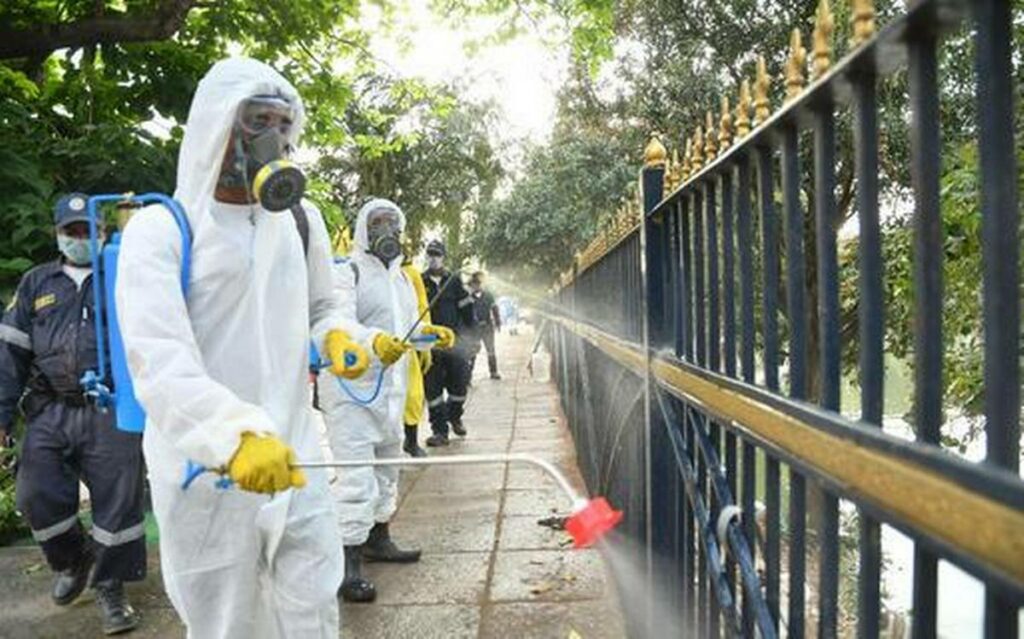In the past week, Maharashtra has seen a surge in cases of Covid-19, with 5,210 new cases reported on Monday. This comes at a time when two new variants of the virus were discovered in samples in the Vidarbha region of the state.
More than 2,400 cases of Covid-19 have been reported since 15 February in the Amravati district and 500 new cases in the Yavatmal district. On Thursday, the state government imposed a ten-day lockdown in Yavatmal and announced a strict week-long lockdown in Amravati on Sunday.
Researchers found the ‘E484K’ mutation of the virus in four samples from Amravati on February 18 during genome sequencing of Covid-19 infected blood samples.
In the United Kingdom, South Africa and Brazil, since this mutation was discovered in the new, fast-spreading Covid strains, district officials were concerned that the variant could transmit rapidly across Maharashtra and the country.
In one sample from Yavatmal, researchers in Maharashtra also found the ‘N440K’ mutation. In December 2020, in Andhra Pradesh and parts of northern India, the N440K variant was found.
Last week, the state government of Maharashtra denied detecting any virus mutations similar to those found in the United Kingdom, Brazil or South Africa. But Dr Randeep Guleria, Director, AIIMS, said on Saturday that the new strain found in Amravati is “highly transmissible and hazardous” and could cause people to re-infect.
Further recognition of the new strains came on Tuesday when officials said that two variants, E484K and N440K, had actually been observed in Maharashtra, Kerala and Telangana samples.
Nevertheless, the Director-General of the Indian Council of Medical Research stated that, for the time being, these variants cannot be linked to the surge in cases of the virus.
What are the new mutations?
It is understood that infectious viruses mutate as they jump from one body to another, and since the outbreak of the pandemic last year, thousands of Covid-19 mutations have been reported around the globe. However, some mutant forms, such as the UK version that caused the second lockdown in Britain over the past few months, are more contagious than others.
In Maharashtra, the E484K mutation was first observed in four of the 12 Amravati blood samples contaminated with the virus. The affected individuals had no travel history outside the district in all four cases and had not been in contact with each other, but all their families had tested positive for Covid-19.
Will vaccines fight the mutations?
As of now, experts are not sure if Covishield and Covaxin, the two Covid-19 vaccines available in India, will be successful against the Maharashtra mutations.
In an ongoing analysis at Oxford University earlier this month, the Oxford-AstraZeneca vaccine, known as Covishield in India, was found effective against the UK strain of the virus. However, owing to its poor effectiveness on the latest strain of the virus, South Africa halted its roll-out of the same vaccine.
In the case of the N440K variant first identified in Andhra Pradesh and North India, genome scientists at the Council of Science and Industrial Research found that it was capable of resisting the body’s immune system-generated antibodies. But to understand the impact of available vaccines on it, they will need to research it further.
How can people stay safe?
The Union Health Ministry announced at a Covid-19 press conference on Tuesday that the Centre would send special teams to Maharashtra, Kerala and other states where cases have surged, to better understand the reasons behind the rising numbers.
While more information about the new Covid-19 variants is needed in Maharashtra, experts agree that they may only be partly responsible for the surge in cases.
The key explanation, they say, is that individuals are no longer strictly observing Covid security guidelines in public: vast numbers of individuals are now attending group activities, not practising physical distancing and not properly wearing masks.
“One of India’s leading virologists, Dr Jacob John, said, “People have thought the danger is over, but we can’t afford to do that.
Indeed, the confirmation of the new variants calls for greater degrees of precaution.
“All transportation in and out must be limited in the districts where the latest variants have been discovered. Masks and hand sanitisation should be obligatory and social distancing in public must be followed very strictly. The lockdown, no relenting, no relaxing, must be just like last year,” said John.

